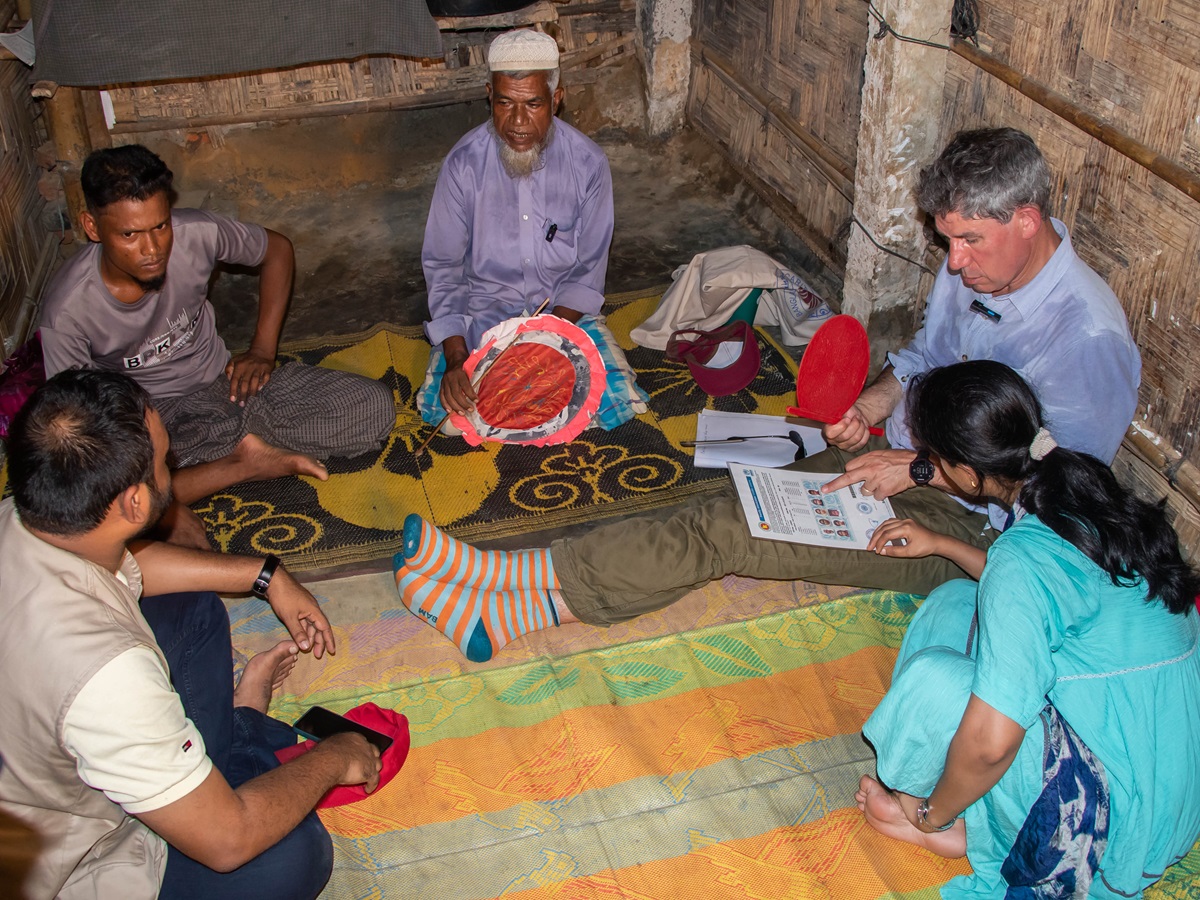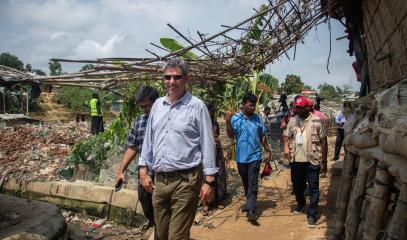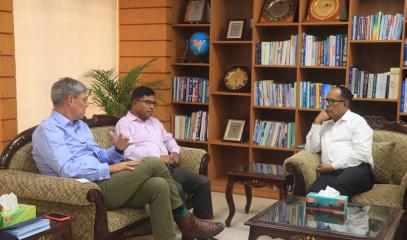Caritas Internationalis in Cox's Bazar calls on the world to do more for the Rohingya
Caritas Secretary General Alistair Dutton visits the refugee camps where Caritas Bangladesh has been active since 2017 together with the Government of Bangladesh. Global food aid has fallen to US$ 10 per person per month, which has serious consequences. “Rohingya families are among the most vulnerable people in our world today,” Dutton said. “Teenagers have now spent half of their life in these settlements.” The international community cannot leave Bangladesh alone.
Dhaka (AsiaNews) – The Secretary General of Caritas Internationalis, Alistair Dutton recently visited the Rohingya camps in Cox's Bazar, Bangladesh, where he expressed gratitude to the Government of Bangladesh and the local Church for what their work over the years. He also slammed the international community for leaving them alone to cope with the tragedy of the Rohingya refugees.
Dutton’s visit echoes the latest appeals made by Pope Francis, who has often spoken out against the suffering of the Rohingya, after personally meeting a group of them during his visit to Bangladesh in 2017.
“I am profoundly moved by the hospitality and enduring support that the Bangladesh Government has shown for Rohingya refugees for the past seven years,” Dutton said.
“While the attention of the world has moved on, the Rohingya people continue to struggle in these forgotten camps. But the Bangladesh Government can’t be expected to support them alone. Other countries need to step up with more funding for this crisis.”
For Dutton, “We must not forget the Rohingya people. Rohingya families are among the most vulnerable people in our world today, living on marginal land, without the right to work. Teenagers have now spent half of their life in these settlements. We must do more to ensure their safety now and their options for the future.”
Since the start of the refugee crisis in 2017, aid has dropped sharply. Global funding for refugees’ food needs has dropped to per person per month, while funding for other sectors has fallen even more, while inflation is running at about 11 per cent.
Consequently, living conditions are deteriorating, while the settlements' reception, water and sanitation facilities require repairs and maintenance. For children, education and safety have taken serious steps backwards.
In 2024, the Bangladeshi authorities launched a Joint Response Plan for the Rohingya Humanitarian Crisis with the aim of raising US$ 852.4 million to help 1.35 million Rohingya and host communities.
The intervention seeks to provide safe housing, education, water and sanitation, medical care, mental health services, and livelihood projects. Despite these efforts, however, last year's funding covered only 65 per cent of the response plan.
Between 2017 and 2023, Caritas spent US$ 45 million on emergency work for the Rohingya and members of host communities in Cox's Bazar and Bhasanchar, helping almost 100,000 people in housing support, safety, disaster risk reduction, education, water, and sanitation.
“Over the past six years, more than 200,000 children have been born in the camps. They have never seen their home country and have no nationality. They are stateless,” lamented Dutton.
“This response requires renewed international attention and equitable burden-sharing by countries in the region and beyond, together with pressure on Myanmar for safe and dignified return of the Rohingya with their rights restored.”
“I will be leaving Bangladesh deeply inspired by the humanity, compassion, and solidarity that the Bangladesh government, Caritas Bangladesh, and local communities have shown,” said the secretary general of Caritas Internationalis -.
“Rohingya families [. . .] need our attention, resources, love, and prayers more than ever. Let’s collectively meet this call for humanity,” Dutton stressed.
For Sebastian Rozario, the executive director of Caritas Bangladesh, Dutton's visit was a show of solidarity and unity that binds the global Caritas family.
“The plight of the Rohingya people remains one of the most urgent humanitarian crises of our time. Despite the unwavering commitment of our teams on the ground, we continue to grapple with severe underfunding, which hampers our ability to provide necessary support and services.”
Dutton’s “presence here shines a crucial spotlight on this forgotten crisis, and we are hopeful that it will galvanize the global community to renew their commitment and resources to this cause.”
Rozario went on to say: “Additionally, through you, we would like to urge the international community, especially the CIMOs, ‘not to forget the Bangladeshi nationals’ who are also suffering from climate-induced disasters, cyclones, floods, flash floods, storms, droughts, discrimination, injustice, human rights violations, land rights issues, lack of livelihood opportunities, and inadequate access to education and healthcare services.”
Caritas Bangladesh oversees some 94 projects in 52 districts, centred on social welfare, food security, education, health, disaster management, and indigenous peoples' development.
In 2022-23, it spent 3,2 billion taka (US$ 27.8 million) to help 1.2 million marginalised people.
12/10/2017 12:42
16/05/2023 12:57
19/09/2022 12:17
01/03/2019 14:13






.JPG)



.png)










